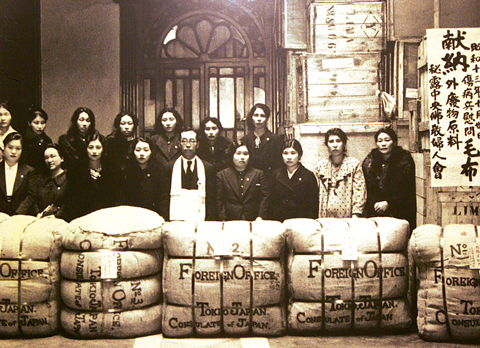Augusto Kague was only 12 when the US government reached far south to his Peruvian farming town and tore his family apart.
It was January 1942 — a month after Japan attacked the US naval base at Pearl Harbor, killing 2,400 and drawing the US into World War II. The roundup of 110,000 Japanese-Americans had begun.
But internment efforts went far beyond US borders — a little-known fact to this day.

PHOTO: AP
Kague’s father, a Japanese immigrant in Peru, was whisked away by security agents, one of 2,264 men, women and children of Japanese ancestry arrested in Latin America and shipped off to US camps. They were interned under the guise of securing Western Hemisphere interests, including the Panama Canal. About 800 were used in prisoner swaps with Japan, turned over to a country that some — as Latin American-born descendants of Japanese immigrants — had never seen.
Now, 20 years after Japanese-Americans won redress for their imprisonment, a small community of Peruvians continues to seek justice with the help of the American Civil Liberties Union and a grassroots activist effort based in Northern California.
The group thought it had a breakthrough when a US House Judiciary subcommittee set a July 31 hearing on a bill that would mandate an investigation into the internment of Japanese-Latin Americans and propose remedies.
But the hearing was canceled, and a spokesman for Democratic US Representative Xavier Becerra, the bill’s sponsor, said it’s unclear when it would be rescheduled.
The hearing would have been just one step in a decades-long battle. The US government didn’t include Japanese-Latin Americans when agreeing in 1988 to apologize and pay US$20,000 to interned Japanese-Americans.
The government offered US$5,000 and an apology 10 years ago as part of a settlement agreement for a lawsuit filed on behalf of Japanese-Latin Americans.
While some took the settlement, Kague was one of hundreds who refused it as unfair. His youngest brother, who was born in a Texas internment camp, got US$20,000 as a US citizen.
Three more lawsuits were filed and thrown out, according to the Campaign for Justice, a San Francisco Bay Area coalition seeking redress. The campaign in 2003 also filed a redress petition with the human rights arm of the Organization of American States that is still pending.
Brazil, Panama, Bolivia and other Latin American countries deported people of Japanese ancestry and allowed the US to strip them of their citizenship.

In the sweltering streets of Jakarta, buskers carry towering, hollow puppets and pass around a bucket for donations. Now, they fear becoming outlaws. City authorities said they would crack down on use of the sacred ondel-ondel puppets, which can stand as tall as a truck, and they are drafting legislation to remove what they view as a street nuisance. Performances featuring the puppets — originally used by Jakarta’s Betawi people to ward off evil spirits — would be allowed only at set events. The ban could leave many ondel-ondel buskers in Jakarta jobless. “I am confused and anxious. I fear getting raided or even

Eleven people, including a former minister, were arrested in Serbia on Friday over a train station disaster in which 16 people died. The concrete canopy of the newly renovated station in the northern city of Novi Sad collapsed on Nov. 1, 2024 in a disaster widely blamed on corruption and poor oversight. It sparked a wave of student-led protests and led to the resignation of then-Serbian prime minister Milos Vucevic and the fall of his government. The public prosecutor’s office in Novi Sad opened an investigation into the accident and deaths. In February, the public prosecutor’s office for organized crime opened another probe into

RISING RACISM: A Japanese group called on China to assure safety in the country, while the Chinese embassy in Tokyo urged action against a ‘surge in xenophobia’ A Japanese woman living in China was attacked and injured by a man in a subway station in Suzhou, China, Japanese media said, hours after two Chinese men were seriously injured in violence in Tokyo. The attacks on Thursday raised concern about xenophobic sentiment in China and Japan that have been blamed for assaults in both countries. It was the third attack involving Japanese living in China since last year. In the two previous cases in China, Chinese authorities have insisted they were isolated incidents. Japanese broadcaster NHK did not identify the woman injured in Suzhou by name, but, citing the Japanese

RESTRUCTURE: Myanmar’s military has ended emergency rule and announced plans for elections in December, but critics said the move aims to entrench junta control Myanmar’s military government announced on Thursday that it was ending the state of emergency declared after it seized power in 2021 and would restructure administrative bodies to prepare for the new election at the end of the year. However, the polls planned for an unspecified date in December face serious obstacles, including a civil war raging over most of the country and pledges by opponents of the military rule to derail the election because they believe it can be neither free nor fair. Under the restructuring, Myanmar’s junta chief Min Aung Hlaing is giving up two posts, but would stay at the